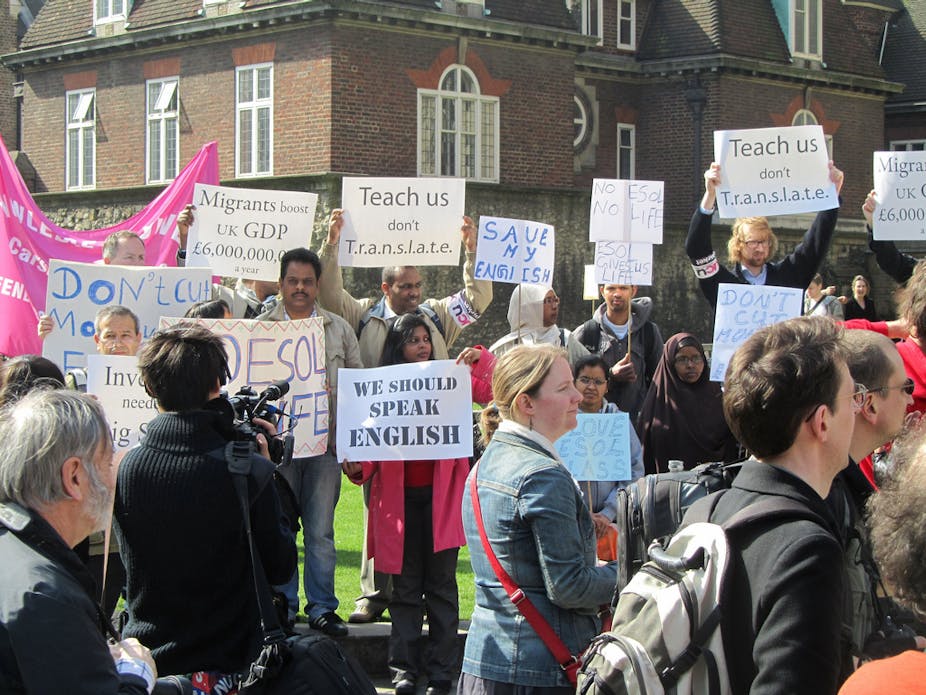A new report from the think-tank Demos is calling for a new national strategy for the way we teach English to migrants in the UK. Its researchers point to 850,000 people in the most recent census who said they could not speak English properly.
I broadly agree with the tenor of the report and its calls for wider changes in policy and funding of English for speakers of other languages (ESOL). It is these that need fixing, rather than the way professionals are actually teaching English to migrants. But I disagree with the suggestion that money could be saved from translating local council documents and spent on English teaching. This is simplistic and ignores the reality on the ground for many migrants.
Short-term funding
Many of the report’s insights echo what informed opinion in the field, such as the National Association for Teaching English and Community Languages to Adults, the Action for ESOL campaign, and NIACE have been saying for a number of years.
It highlights the damaging impact of funding cuts on ESOL provision, citing data released through a freedom of information request that found government ESOL funding had reduced 40% in the last five years.
Demos points to the prevailing short-termism of funding sources. In my experience this requires adult ESOL professionals to spend less time on core teaching and learning and more on writing funding bids. These either squeeze existing students into new “fundable categories” or abandon them for those who will attract funding.
I also applaud the recognition by Demos that so-called “soft outcomes”, such as increased confidence and self-esteem, should be recognised when it comes to a national strategy. This could help to broaden the aims of adult English-teaching beyond a narrow focus on access to work, important though that is.
Don’t cut back from translation
But I disagree that money can be saved to spend on adult ESOL by cutting back on translation services. This assumes that there is a population of people happy to rely on translation services and never learn English. I have invariably found migrants want to learn, although they face many practical barriers.
Translation services can only ever be a partial solution to communication problems, but they are an essential one. They need to be provided in complement to strong English language teaching provision. This must both reach out to the most isolated and disadvantaged, as well as stretching and enabling achievement at the other end of the spectrum. This achievement can be economic, but also academic and civic.
Many of the points Demos make are interconnected. The increasing use of volunteers to teach English to migrants is a direct consequence of the shrinking of provision due to funding cuts. I started my professional life in adult ESOL in the mid 1970s organising a volunteer teaching scheme so I know something of this at first hand. There is a sense of déjà vu in the present situation.
Quality language learning for all
There are frequent complaints in the report that the ESOL system is not fit for purpose. Demos points to a 2008 Ofsted report that found questionable quality in around half of providers.
Yet in the mid 2000s I directed the adult ESOL Effective Practice Project which found many examples of excellent, inspiring provision. Let’s hope this report can trigger commitment from the major parties to reform the policy and funding regime and bring adult English teaching to migrants out of a hand-to-mouth existence.
It’s also important to recognize that the 850,000 potential ESOL learners are not the only people in our country who have problems with language learning. Many mainstream, English-speaking citizens would struggle to put together two words in a language not their own, even if their life depended on it.
The report points at times to the need to make multilingualism a resource not a problem. To me, this calls for a recognition that our national language problem is bigger than integrating those who don’t speak English. To recognise this would call for not a National ESOL Strategy, but a National Language Strategy in which access to English would be an essential – but not the only – component. If one of the major parties were to pick up this challenge it would be truly visionary.

